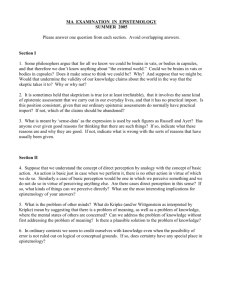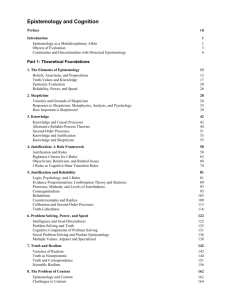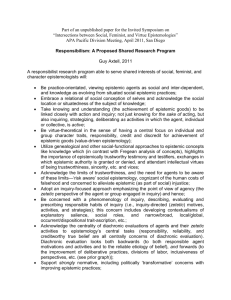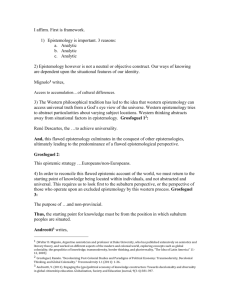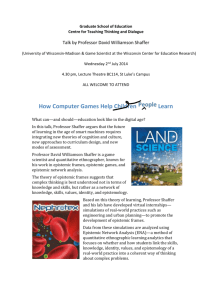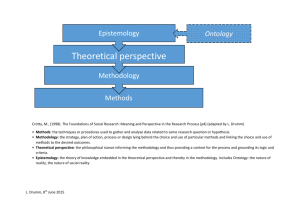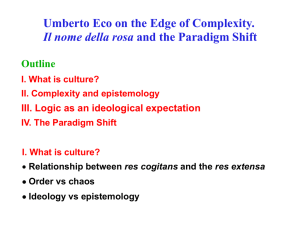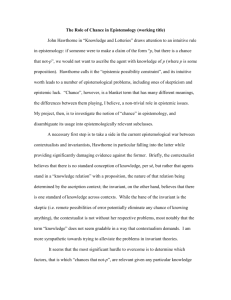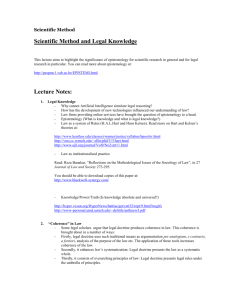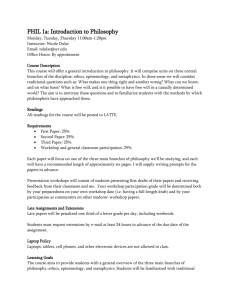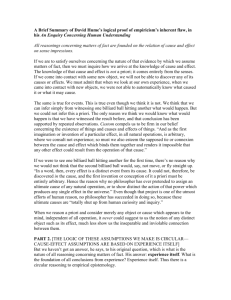Epistemology
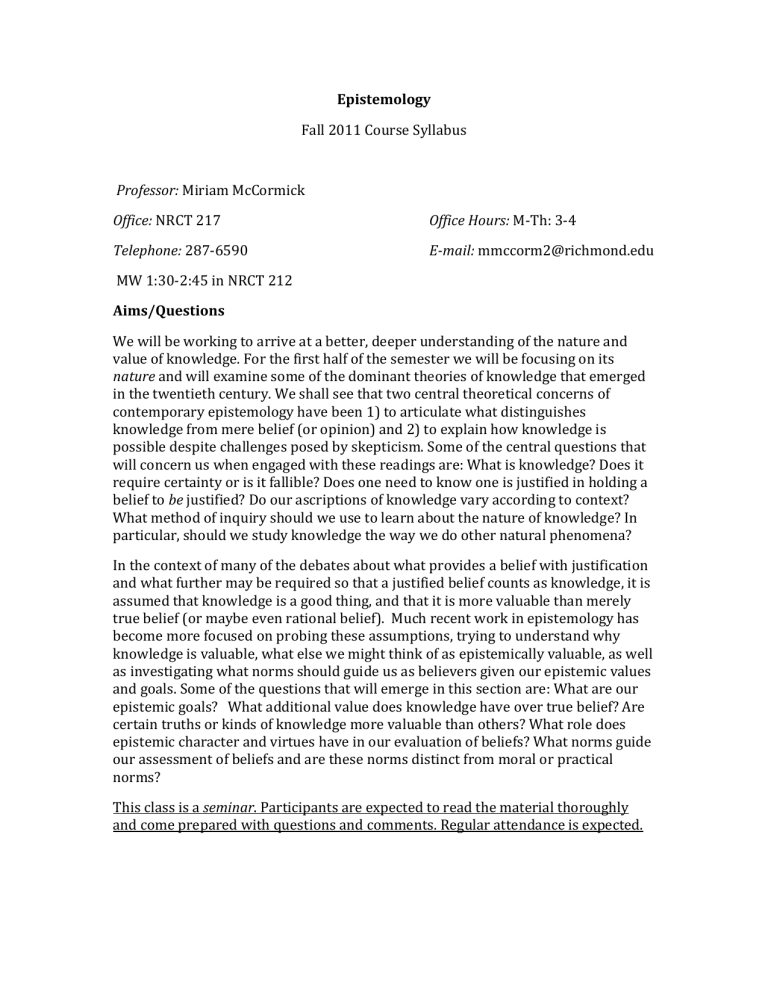
Professor: Miriam McCormick
Office: NRCT 217
Epistemology
Fall 2011 Course Syllabus
Office Hours: M-Th: 3-4
Telephone: 287-6590
MW 1:30-2:45 in NRCT 212
E-mail: mmccorm2@richmond.edu
Aims/Questions
We will be working to arrive at a better, deeper understanding of the nature and value of knowledge. For the first half of the semester we will be focusing on its
nature and will examine some of the dominant theories of knowledge that emerged in the twentieth century. We shall see that two central theoretical concerns of contemporary epistemology have been 1) to articulate what distinguishes knowledge from mere belief (or opinion) and 2) to explain how knowledge is possible despite challenges posed by skepticism. Some of the central questions that will concern us when engaged with these readings are: What is knowledge? Does it require certainty or is it fallible? Does one need to know one is justified in holding a belief to be justified? Do our ascriptions of knowledge vary according to context?
What method of inquiry should we use to learn about the nature of knowledge? In particular, should we study knowledge the way we do other natural phenomena?
In the context of many of the debates about what provides a belief with justification and what further may be required so that a justified belief counts as knowledge, it is assumed that knowledge is a good thing, and that it is more valuable than merely true belief (or maybe even rational belief). Much recent work in epistemology has become more focused on probing these assumptions, trying to understand why knowledge is valuable, what else we might think of as epistemically valuable, as well as investigating what norms should guide us as believers given our epistemic values and goals. Some of the questions that will emerge in this section are: What are our epistemic goals? What additional value does knowledge have over true belief? Are certain truths or kinds of knowledge more valuable than others? What role does epistemic character and virtues have in our evaluation of beliefs? What norms guide our assessment of beliefs and are these norms distinct from moral or practical norms?
This class is a seminar. Participants are expected to read the material thoroughly and come prepared with questions and comments. Regular attendance is expected.
Evaluation
Weekly reflections (due by Sunday, 10 PM at the latest) emailed to me: 15%
One five-page paper critical paper and presentation: 20% Due by mid-term
Participation and discussion, including discussion on blackboard: 15%
Final paper (approx.. 15 pages): 40% Due December 8
Draft of final paper 10% Due before Thanksgiving Break.
All work must be handed in to pass the course. Late assignments will not be accepted.
Honor Code: The essays must be your own individual and independent work and must satisfy the conditions of the honor pledge.
READING ASSIGNMENTS (SUBJECT TO REVISION)
Readings will be available online through BlackBoard
1.
The Nature and Limits of Knowledge
Date Topics and Readings
8/22 Introduction to Course/ Skepticism
8/24 Skepticism
Williams, “Skepticism”
8/29 No Class
8/31 The Analysis of Knowledge
[Selections from Plato’s Theatetus, ]
Nozick, “Knowledge and Skepticism”
Klein, “A Proposed Definition of Propositional Knowledge"
9/5 The Analysis of Knowledge continued.
9/7, 9/12 Foundations and Coherence
Sellars, "Does Empirical Knowledge Have a Foundation?"
Sosa, "The Raft and the Pyramid" (skip appendix)
Bonjour, “The Coherence Theory of Empirical Knowledge”
.
9/14, 9/19, 9/21 Contextualism
DeRose, "Solving the Skeptical Problem"
Lewis, "Elusive Knowledge"
Schiffer, "Contextualist Solutions to Skepticism"
9/26, 9/28 Reliabilism and Externalism
Goldman, “What is Justified Belief?”
Conee and Feldman, "The Generality Problem for Reliabilism"
Lehrer, "Externalism and Epistemology Naturalized"
10/3, 10/5, 10/12 Epistemological Naturalism
[Quine, "Epistemology Naturalized"]
Kim, "What Is `Naturalized Epistemology'?"
Bonjour, “Against Naturalized Epistemology”
Kornblith, “Naturalistic Epistemology and its Critics”
2. Epistemic Value and Epistemic Virtues
10/17, 10/19 The Value of Knowledge
Zagzebski, On Epistemology, Chapters 1 and ^
Wayne Riggs, “The Value Turn in Epistemology”
[Prtichard, “The Value of Knowledge” Stanford Encyclopedia of Philosophy]
10/24, 10/26 Character and Virtue
Baehr, “Character in Epistemology
Lackey “Why we Don’t Deserve Credit for Everything We Know”
10/31, 11/2, 11/7 Greco’s Virtue Account
Greco, Achieving Knowledge: A Virtue Theoretic Account of Epistemic
Normativity, Chapters 1, 5-6, 8
11/9, 11/14 Sosa’s Virtue Account
Sosa, Knowing Full Well, Chapters 1-3
Grimm, “Epistemic Normativity” Ram Neta visit and talk, 11/14
11/16, 11/21, 11/28, 11/30 Norms of Belief/ Epistemic Responsibility
William James, “The Will to Believe”, Clifford, “The Ethics of Belief”
Williams, “Deciding to Believe”
John Heil “Believing Reasonably”
Kornblith “Epistemic Normativity”
McCormick, “Taking Control of Belief.”
